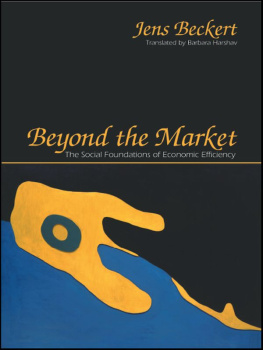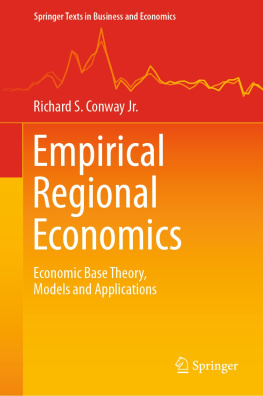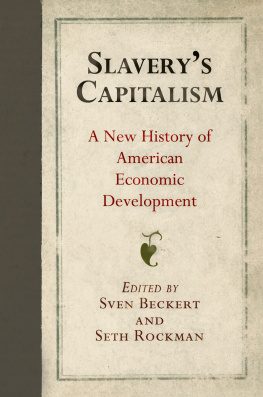BEYOND THE MARKET
Jens Beckert
BEYOND THE MARKET
THE SOCIAL FOUNDATIONS OF ECONOMIC EF F I CIENCY
Translated by Barbara Harshav
PRINCETON UNIVERSITY PRESS
PRINCETON AND OXFORD
ENGLISH TRANSLATION COPYRIGHT 2002 BY PRINCETON UNIVERSITY PRESS
PUBLISHED BY PRINCETON UNIVERSITY PRESS, 41 WILLIAM STREET,
PRINCETON, NEW JERSEY 08540
IN THE UNITED KINGDOM: PRINCETON UNIVERSITY PRESS,
3 MARKET PLACE, WOODSTOCK, OXFORDSHIRE OX20 1SY
ORIGINALLY PUBLISHED IN GERMAN AS GRENZEN DES MARKTES:
DIE SOZIALEN GRUNDLAGEN WIRTSCHAFTLICHER EFFIZIENZ
1997 BY CAMPUS VERLAG
ALL RIGHTS RESERVED
LIBRARY OF CONGRESS CATALOGING-IN-PUBLICATION DATA
BECKERT, JENS, 1967 [GRENZEN DES MARKTES. ENGLISH]
BEYOND THE MARKET: THE SOCIAL FOUNDATIONS OF ECONOMIC
EFFICIENCY / JENS BECKERT; TRANSLATED BY BARBARA HARSHAV.
P. CM.
ORIGINALLY PUBLISHED AS: GRENZEN DES MARKTES.
INCLUDES BIBLIOGRAPHICAL REFERENCES AND INDEX.
eISBN : 978-1-40082-544-8
1. ECONOMICSSOCIOLOGICAL ASPECTS. 2. DECISION MAKINGSOCIAL ASPECTS. I.
TITLE.
HM548.B43613 2002
306.3'4DC212001058064
BRITISH LIBRARY CATALOGING-IN-PUBLICATION DATA IS AVAILABLE
THIS BOOK HAS BEEN COMPOSED IN BERKELEY BOOK MODIFIED TYPEFACE
PRINTED ON ACID-FREE PAPER.
WWW.PUP.PRINCETON.EDU
PRINTED IN THE UNITED STATES OF AMERICA
13579108642
CONTENTS
P
I
PREFACE
THIS BOOK began in a seminar given by Robert Heilbroner and Ross Thompson at the New School for Social Research in the autumn of 1990. Titled The Autonomy of Economic Life, the seminar examined the relationship of the economy and society as well as that of economics and other social sciences. Ever since then, I have been interested in these subjects. I am grateful first to Hans Joas, who supervised the work, encouraging the clarification of conceptual issues. In many respects, my thinking has been deeply influenced by the work of Hans Joas and our many conversations. I would also like to thank Heiner Ganssmann, Wolfgang Knobl, Claus Offe, Harald Wenzel, and Dietrich Winterhager, who read the entire book or individual chapters and made helpful remarks. My thanks to the Studienstiftung des deutschen Volkes for financial assistance. I wrote most of the dissertation in the academic year 199495 as a Visiting Research Fellow in the Department of Sociology of Princeton University, where the ideal working conditions were an essential advantage for the progress of the book. For making this stay both possible and intellectually stimulating I should like to thank the department, particularly Paul DiMaggio and Viviana Zelizer. I am grateful to the Gottlieb Daimler and Carl Benz Foundation for a stipend during my year in Princeton. Volker Bien, Karin Goihl, and Anne-Christin Muth helped with literature and preparation of the final manuscript. Last but not least, thanks to my wife Farzaneh Alizadeh for all her support during the not always easy phases of the writing process. The book is dedicated to the memory of my father.
Berlin, July 1997
Note: For the English translation, the chapter on Durkheim has been slightly abridged, while some new material has been added to the chapter on Giddens and to the conclusions. The other parts of the manuscript remain unchanged, except for some corrections in the interest of legibility. Permission from Kluwer Publishers for using material from my article What is sociological about economic sociology? Uncertainty and the embeddedness of economic action (Theory and Society 25: 803-840) is gratefully acknowledged.
Cambridge, Mass., February 2002
BEYOND THE MARKET
INTRODUCTION
ALTHOUGH sociology and economics have ignored one another for decades, developments in both disciplines during the past twenty years suggest that cautious rapprochements are beginning to crack the solid lines that have separated them. Catch phrases like those advanced by the American economist James Duesenberry (1960: 233)that economics is all about how people make choices; sociology is all about how they dont have any choices to make, are no more valid as a description of the relationship between the two fields today than they were when first pronounced.
Ever since the early 1970s, starting from criticism of the restrictive assumptions of the general equilibrium theory and developments in game theory, economics has clearly been opened to problems and subjects that had previously been ascribed essentially to the domain of sociology. These include developments in the economics of information, the transaction cost theory, principal-agent approaches, the new historical economy, and the incorporation of bounded rationality into game theory. No matter how varied these modeling strategies are, they all agree that more consideration should be given to psychological and social constraints, and that studies need to investigate how equilibrium models change when the heroic assumptions of information and structure of the standard models of economics are loosened.
Meanwhile, in the 1960s and 1970s, sociology moved away from functionalist and structuralist theoretical approaches and became increasingly devoted to approaches based on theories of action. Criticism of functionalism led especially to projects intended to make social structures and processes intelligible in reference to social action, without being tied to the rational-actor model for its behavioral typology. On this background, a renewed interest in socioeconomic problems has developed since the 1980s. In the 1950s and 1960s, economic sociology dealt with problems that were marginalized by economics. But the new economic sociologyclaims to be able to demonstrate on the ground of the substantial core areas of economic theory how economic functions can be understood better through sociological conceptualizations. Even though the objectives of the new economic sociology must be seen in the context of the repudiation of economic imperialism, it nevertheless reveals an opening to economics because sociology starts dealing with social phenomena that had long been considered the exclusive domain of economics.
In the mutual debate over the issues and approaches of each others discipline, sociology and economics intersect. Thus, some of the modeling strategies, especially transaction cost theory and Douglass Norths work in the field of economic history, were adopted with critical candor by economic sociology. In economic theory, those approaches also express at least a cautious opening to sociology. Historical data are included along with the possibility of irrational action on account of cognitive constraints, and the spread of inefficient equilibria on account of informational limitations, so that the field is partly dissociated from the assumption of universal efficiency of economic institutions.
While these developments in economics and the new economic sociology indicate an entente between the disciplines, they still remain separated from one another at the demarcation line of the rational-actor model. The central assumption of the maximization of utility has been both criticized and expanded by the theory of bounded rationality and by attempts to integrate altruistic behavioral motivations, yet the paradigmatic core of economics is defined by the action-theoretical notion of an individualized, universal maximizer of utility. Ever since the establishment of modern economics in the eighteenth century, the moral-philosophical justification for the behavioral model of homo oeconomicus has consisted of the expectation, expressed in the metaphor of the invisible hand, that action directed at self-interest leads to a desirable allocation of economic goods, both collectively and individually. Pursuit of private interest is the basis for the emergence of the common welfare. This link between behavioral expectations and institutional structure is also the basis of liberal economic policy: the demand for unlimited markets by removing trade barriers and restraining government regulation is justified normatively by the expected increase of wealth.
Next page








